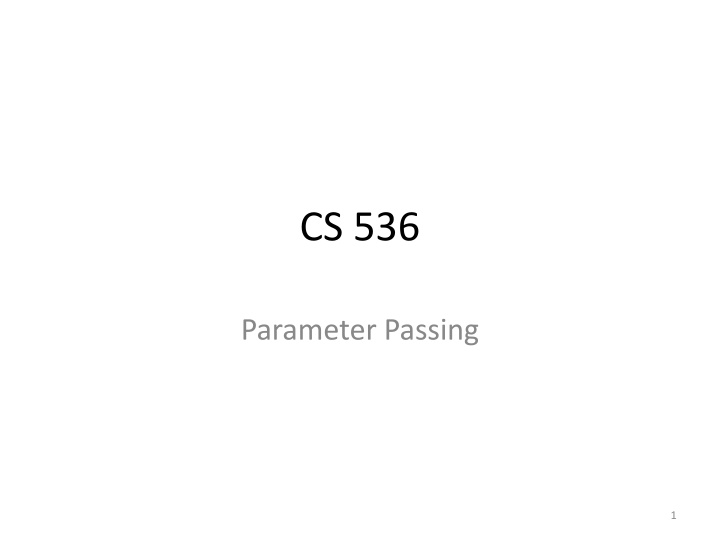
Parameter Passing and Variable Handling in Function Calls
Explore the concepts of parameter passing, variable storage, and value propagation in function calls, covering topics like storing variables, different styles of parameter passing, L- and R-values, memory references, and types of parameter passing. Dive into the nuances of pass-by-value and pass-by-reference in various programming languages.
Download Presentation

Please find below an Image/Link to download the presentation.
The content on the website is provided AS IS for your information and personal use only. It may not be sold, licensed, or shared on other websites without obtaining consent from the author. If you encounter any issues during the download, it is possible that the publisher has removed the file from their server.
You are allowed to download the files provided on this website for personal or commercial use, subject to the condition that they are used lawfully. All files are the property of their respective owners.
The content on the website is provided AS IS for your information and personal use only. It may not be sold, licensed, or shared on other websites without obtaining consent from the author.
E N D
Presentation Transcript
CS 536 Parameter Passing 1
Roadmap Last Time Storing variables Locals, non-locals, globals This Time Propagating values from one function to another 2
Outline Parameter Passing Different styles What they mean How they look on the stack 3
Vocabulary Define a couple of terms that are helpful to talk about parameters We ve already obliquely talked about some of these 4
L- and R- Values L-Value A value with a place of storage R-Value A value that may not have storage a = 1; a = b; b++; 5
Memory references Pointer A variable whose value is a memory address Aliasing When two or more variables 6
Parameter Passing In definition: void v(int a, int b, bool c) { } Terms Formals / formal parameters / parameters In call: v(a+b,8,true); Terms Actuals / actual parameters / arguments 7
Types of Parameter Passing We ll talk about 4 different varieties Some of these are more used than others Each has it s own advantages / uses 8
Pass by Value On function call Values of actuals are copied into the formals C and java always pass by value void fun(int a){ int a = 1; } void main(){ int i = 0; fun(i); print(i); } 9
Pass by Reference On function call The address of the actuals are implicitly copied void fun(int a){ int a = 1; } void main(){ int i = 0; fun(i); print(i); } 10
Language Examples Pass by value C and Java Pass by reference Allowed in C++ and Pascal 11
Wait, Java is Pass by Value? All non-primitive L-values are references void fun(int a, Point p){ int a = 0; p.x = 5; } void main(){ int i = 0; Point k = new Point(1, 2); fun(i,k); } 12
Pass by Value-Result When function is called Value of actual is passed When function returns Final values are copied back to the actuals Used by Fortran IV, Ada As the language examples show, not very modern 13
Pass by Name Conceptually works as follows: When a function is called Body of the callee is rewritten with the text of the argument Only really makes sense with non-local scope rules Like macros in C / C++ 14
Implementing Parameter Passing Let s talk about how this actually is going to work in memory 15
Lets draw out the memory int g; void f (int x, int y, int z){ x = 3 ; y = 4; z = y; } Consider pass-by-value and pass-by reference void main(){ int a = 1, b = 2, c = 3; f(a,b,c); f(a+b,7,8); } 16
Bad use of R-Values Can prevent programs that are valid in pass by value from working in pass by reference Literals (for example) do not have locations in memory We will rely on the type checker to catch these errors. 17
Lets draw out the memory again int g; void f (int x, int y, int z){ x = 3 ; y = 4; z = y; } Consider pass by value-result and pass by name void main(){ int a = 1, b = 2, c = 3; f(a,b,g); f(a+b,7,8); } 18
Object Handling class Point{ Position p; } void alter(Point pt, Position pos){ pos = pt.p; pos.x++; pos.y++; } void main(){ Position loc; Point dot; // initialize loc with x=1,y=2 // initialize dot with loc alter(dot, loc); } class Position{ int x, y; } In java, loc and dot are references to objects (on the heap) In C++, loc and dot are objects with no indirection (on the stack) 19
Efficiency Considerations Pass by Value Copy values into AR (slow) Access storage directly in function (fast) Pass by Address Copy address into AR (fast) Access storage via indirection (slow) Pass by Value-result Strictly slower than pass by value Also need to know where to copy locations back 20
Aliasing Can happen Via pointers in pass-by-value alter, previously When a global is passed by reference 21
